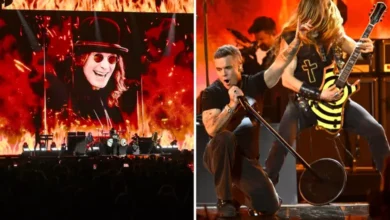YUNGBLUD Unleashes a Raw, Electric Storm in the Official VHS Performance of “Wild Woman,” Proving Rock’s Future Is Already Here
The official VHS-style video for YUNGBLUD’s Wild Woman arrived on November 23, 2025, carrying the raw pulse of a live moment rather than the polish of a studio drop. By the time the clip hit, fans already knew the track as part of the Aerosmith x YUNGBLUD One More Time EP, but the VHS presentation framed it differently: not as a “new single,” but as a living, breathing performance. Grainy texture, quick cuts, and tour-sweat energy made the song feel like it was born onstage, right where this collaboration belongs.
Wild Woman itself sits inside a very specific late-2025 storyline. YUNGBLUD and Aerosmith had just bridged generations at the VMAs Ozzy tribute earlier in the fall, a moment that didn’t feel like a cameo but like a spark that kept spreading. That chemistry turned into a studio session, then into One More Time, released on November 21. So when the VHS video dropped two days later, it wasn’t random content. It felt like the aftershock of a partnership that had already proven it could shake arenas.
You can hear that generational collision in the song’s DNA. Wild Woman isn’t trying to cosplay classic rock, and it isn’t trying to remix Aerosmith into something modern for the sake of trends. Instead, it lands in a middle space where YUNGBLUD’s restless vocal personality rides on top of a blues-rock skeleton that feels lived-in and American. The studio version leans lush and cinematic, but the VHS live cut strips it down to the core idea: a big melody built for a crowd to carry back to the band.
The performance captured in the VHS clip is from the IDOLS world tour run that followed the EP rollout. That matters because tour performances don’t behave like music videos; they breathe in real time. You feel the band speed up half a step, slow down for a chorus, and then surge again when the crowd starts taking over. The VHS sheen highlights those tiny imperfections instead of hiding them, and that’s exactly why the performance feels honest. It’s not “perfect.” It’s alive.
The staging is deliberately low-frills compared to a typical award-show moment. YUNGBLUD is in his natural habitat here: a wide stage, a loud band, and a crowd that doesn’t need to be sold on the emotion. He moves like he’s yanking the song out of his chest rather than delivering something rehearsed. Even through the lo-fi filter, you can see that restless body language he’s carried since the start of his career. Wild Woman becomes less a track and more a situation happening right now.
Vocally, the VHS performance is where the song’s real argument happens. Fans have said for years that YUNGBLUD can channel other singers’ flavors without losing his own presence, and this clip makes that obvious. He slips into a classic-rock rasp at the edges, then swings back into his punk-pop bite in the next phrase. The trick isn’t imitation. It’s translation. He borrows a color, paints with it, then leaves his own fingerprints all over the canvas.
Aerosmith’s shadow is everywhere without ever swallowing the track. That’s the delicate part of a collaboration with legends: the younger artist can vanish inside the mythology, or he can stand tall beside it. In Wild Woman, especially live, YUNGBLUD stands tall. You hear what he’s taking from Tyler’s theatrical grit and Perry’s bluesy swagger, but you also hear what he refuses to give up — that sharp emotional urgency, that slightly cracked edge that makes his voice feel like a confession more than a performance.
The VHS aesthetic isn’t just nostalgia bait either; it supports the song’s mood. Wild Woman lives in a half-dream space — romantic, reckless, slightly haunted — and the analog look turns the performance into a memory while you’re still watching it. The wobble of the image, the saturated highlights, the sense of “found footage from a perfect night” all deepen the feeling that this is a song about heat and longing, not a song designed for algorithmic cleanliness.
You can also sense how the crowd changes the meaning. In the studio version, Wild Woman feels intimate, almost like a late-night confession in a car with the windows down. In the VHS clip, it becomes communal. The chorus lifts higher because the audience lifts it higher. YUNGBLUD doesn’t dominate the room; he rides it. When fans scream the hook back at him, the track turns into a chant, and the collaboration’s purpose becomes clear: make rock feel like a shared ritual again.
The band arrangement on tour adds bite that some listeners felt was softened on the EP. Live, the drums punch harder, the guitars sound less polished and more dangerous, and the dynamics are wider. It’s the difference between a photograph and a storm. The VHS format exaggerates that difference because it foregrounds rhythm and movement. You aren’t focusing on perfect audio. You’re focusing on the fact that the song is built to hit bodies, not just ears.
Context matters here too, because YUNGBLUD had recently paused parts of his solo touring schedule due to health issues in mid-November, making every live document from this stretch feel even more charged. The VHS performance plays like a reminder of what he returns to when things get hard: the stage, the noise, the people. In that sense, Wild Woman becomes part of his wider 2025 narrative about identity, resilience, and refusing to shrink himself to fit expectations.
Critics have been split on the One More Time EP, some praising the generational link-up and others calling parts of it too overproduced. What’s interesting is how the VHS video quietly answers that debate. It doesn’t argue, it just shows. Whatever you think of the studio mix, the live version in this clip proves the song’s bones are strong enough to stand on their own. A weak track collapses when you strip it down. Wild Woman doesn’t collapse — it spreads.
There’s also a symbolic layer to releasing a tour performance as “official.” Lots of artists post live clips, but packaging it as a VHS-style release says, “this is part of the project’s world.” YUNGBLUD’s whole Idols era has been about world-building — not just songs, but moods, aesthetics, and personal mythology. The VHS video slots into that perfectly. It feels like a relic from a bigger rock story he’s trying to write in real time.
Watching the clip, you can see why older rock fans have started paying closer attention to him, even if they didn’t grow up in his lane. He respects the lineage without becoming a tribute act. That balance is rare. Lots of modern rock-leaning artists either chase vintage sounds too literally or abandon them completely. YUNGBLUD’s gift is that he can step into the old language and still speak with a modern accent. Wild Woman is a showcase of that ability.
By the end of the VHS performance, the main takeaway isn’t the filter, the tour setting, or even the collaboration. It’s the feeling that this song belongs to a stage, and that YUNGBLUD belongs in a space where rock is allowed to be messy, romantic, loud, and human. The video doesn’t try to prove anything with words. It proves it by existing as a moment that looks like the past but sounds like the next chapter.
If the Aerosmith partnership was the spark, the Wild Woman VHS release is the snapshot of the fire catching. It captures a young rock frontman learning how to carry legacy without being crushed by it, and it captures a classic band letting that legacy evolve rather than fossilize. Two days after the EP dropped, this clip arrived like a simple message to anyone watching: rock and roll isn’t done, it’s just changing hands in real time.





